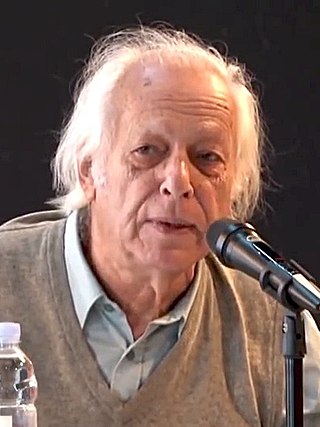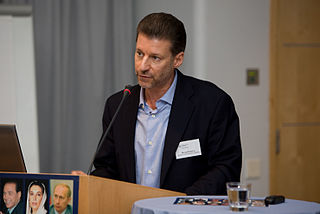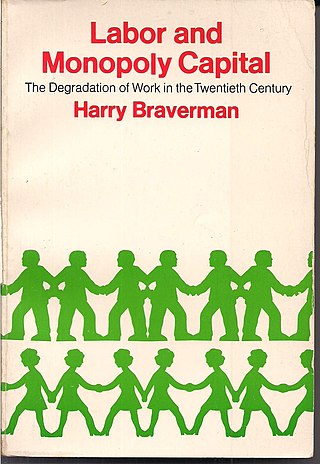
Industrial sociology, until recently a crucial research area within the field of sociology of work, examines "the direction and implications of trends in technological change, globalization, labour markets, work organization, managerial practices and employment relations" to "the extent to which these trends are intimately related to changing patterns of inequality in modern societies and to the changing experiences of individuals and families", and " the ways in which workers challenge, resist and make their own contributions to the patterning of work and shaping of work institutions".

The Monthly Review, established in 1949, is an independent socialist magazine published monthly in New York City. The publication is the longest continuously published socialist magazine in the United States.

The nature and power of organized labor in the United States is the outcome of historical tensions among counter-acting forces involving workplace rights, wages, working hours, political expression, labor laws, and other working conditions. Organized unions and their umbrella labor federations such as the AFL–CIO and citywide federations have competed, evolved, merged, and split against a backdrop of changing values and priorities, and periodic federal government intervention.

William Howard Hinton was an American intellectual, best known for his work on Communism in China. A Marxist, he is best known for his book Fanshen, published in 1966, a "documentary of revolution" which chronicled the land reform program of the Chinese Communist Party (CCP) in the 1940s in Zhangzhuangcun, sometimes translated as Long Bow Village, a village in Shanxi Province in northern China. Sequels (Shenfan) followed the experience of the village during the 1950s and Cultural Revolution. Hinton wrote and lectured extensively to explain the Maoist approach and later to criticize Deng Xiaoping's market-orient reforms.

The Coal strike of 1902 was a strike by the United Mine Workers of America in the anthracite coalfields of eastern Pennsylvania. Miners struck for higher wages, shorter workdays, and the recognition of their union. The strike threatened to shut down the winter fuel supply to major American cities. At that time, residences were typically heated with anthracite or "hard" coal, which produces higher heat value and less smoke than "soft" or bituminous coal.

Samir Amin was an Egyptian-French Marxian economist, political scientist and world-systems analyst. He is noted for his introduction of the term Eurocentrism in 1988 and considered a pioneer of Dependency Theory.
John Beecher was an activist poet, writer, and journalist who wrote about the Southern United States during the Great Depression and the American Civil Rights Movement. Beecher was active in the American labor and civil rights movements. During the McCarthy era, Beecher lost his teaching job for refusing to sign a state loyalty oath. Following a 1967 decision of the California Supreme Court that disallowed such a loyalty oath, he was reinstated in 1977. Beecher's books include Report to the Stockholders, To Live and Die in Dixie, and In Egypt Land.
Harry Braverman (1920–1976) was an American Marxist, worker, political economist and revolutionary. Born in New York City to a working-class family, Braverman worked in a variety of metal smithing industries before becoming an editor at Grove Press, and later Monthly Review Press, where he worked until his death at the age of 55 in Honesdale, Pennsylvania. Braverman is most widely known for his 1974 book Labor and Monopoly Capital: The Degradation of Work in the Twentieth Century, "a text that literally christened the emerging field of labor process studies" and which in turn "reinvigorated intellectual sensibilities and revived the study of the work process in fields such as history, sociology, economics, political science, and human geography."

Ellen Meiksins Wood was an American-Canadian Marxist political theorist and historian.

Elaine Bernard is the executive director of the Labor and Worklife Program at Harvard Law School and a member of the Democratic Socialists of America. She is also a member of the interim consultative committee of the International Organization for a Participatory Society which she describes as offering "an opportunity to reach across borders, time zones, organizations, communities, and individual interests and grow solidarity".
Herbert George Gutman (1928–1985) was an American professor of history at the Graduate Center of the City University of New York, where he wrote on slavery and labor history.

Selig Perlman was an economist and labor historian at the University of Wisconsin–Madison.

The Asian Pacific American Labor Alliance (APALA) is a nonprofit organization of Asian-Pacific American trade union members affiliated with the AFL–CIO. It was the "first and only national organization for Asian Pacific American union members".
Cyrus S. Ching was a Canadian-American who became an American industrialist, federal civil servant, and noted labor union mediator. He was the first director of the Federal Mediation and Conciliation Service (FMCS) and the Wage Stabilization Board.

William I. Robinson is an American professor of sociology at the University of California, Santa Barbara. His work focuses on political economy, globalization, Latin America and historical materialism. He is a member of the International Parliamentary and Civil Society Mission to Investigate the Political Transition in Iraq.

Labor and Monopoly Capital: The Degradation of Work in the Twentieth Century is a book about the economics and sociology of work under monopoly capitalism by the political economist Harry Braverman. Building on Monopoly Capital by Paul A. Baran and Paul Sweezy, it was first published in 1974 by Monthly Review Press.

William Paul Cockshott is a Scottish academic in the fields of computer science and Marxist economics. He is a Reader at the University of Glasgow. Since 1993 he has authored multiple works in the tradition of scientific socialism, most notably Towards a New Socialism and How the World Works.
A master contract or master agreement is a collective bargaining agreement which covers all unionized worksites in an industry, market or company, and which establishes the terms and conditions of employment common to all workers in the industry, market or company.

Joan Greenbaum is an American political economist, labor activist, and Professor Emerita at the CUNY Graduate Center and LaGuardia Community College. She also taught and conducted research at Aarhus University, and the University of Oslo (Informatics) (1995–96). Her numerous books and articles focus on participatory design of technology information systems, technology and workplace organization, and gender and technology.

Michael Heinrich is a German historian of philosophy, political scientist, and mathematician, specialising in the critical study of the development of Marx's thought. Heinrich's work, influenced by Elmar Altvater and the Neue Marx-Lektüre of Hans-Georg Backhaus and Helmut Reichelt is characterised by its focus on the points of ambivalence and inconsistency in the work of Marx. Through this theme, Heinrich challenges both the closed system he identifies with "worldview Marxism", as well as teleological narratives of Marx's intellectual development throughout his life. He is best known for his 1991 study of the theoretical field of classical political economy The Science of Value, his introductory text to the critique of political economy An Introduction to the Three Volumes of Karl Marx's Capital, and his ongoing project to produce a multi-volume biography of Marx, of which the first volume of a projected four was published in 2020.














